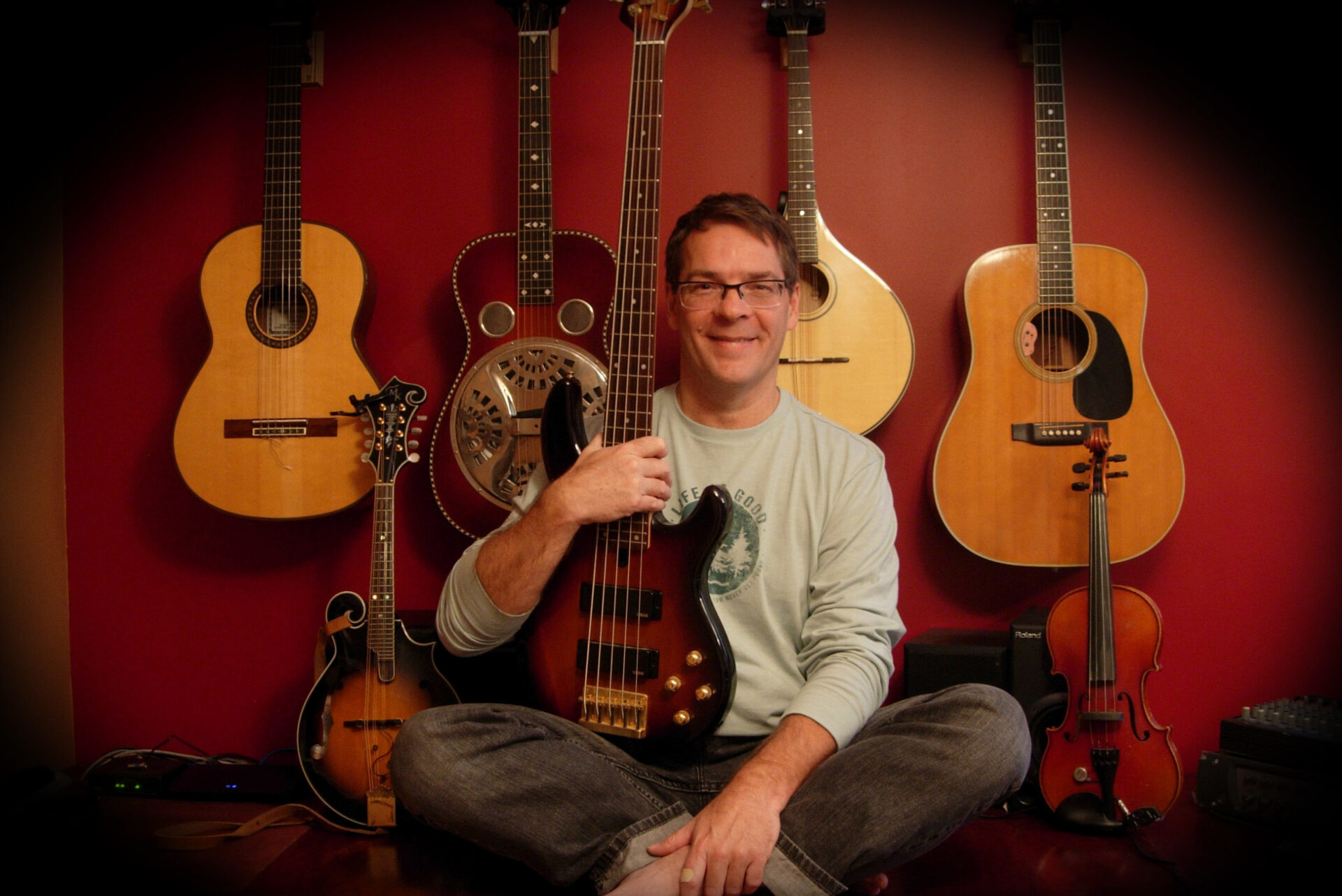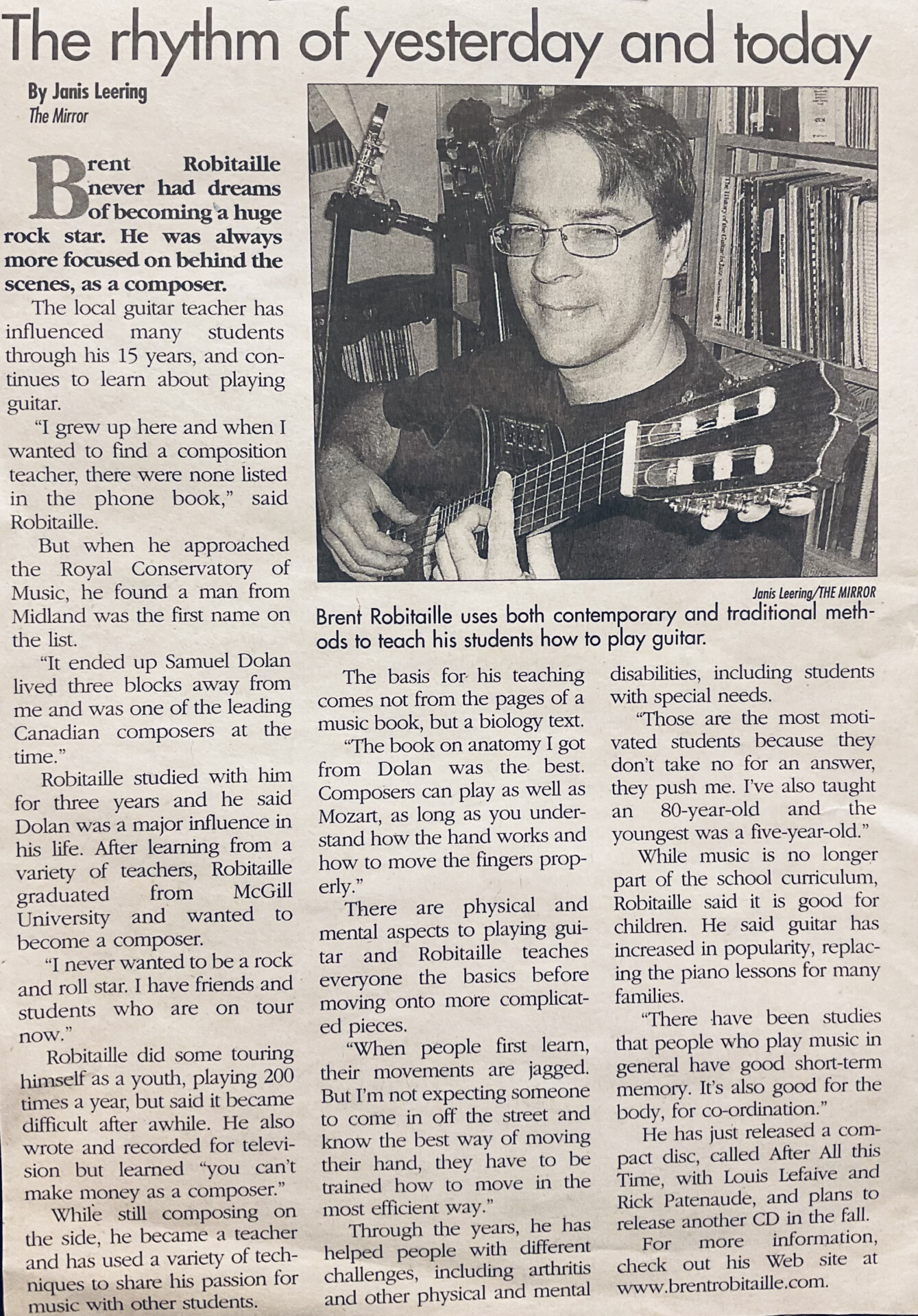Interviews, Publications and Press
Article Publications
Can Composers Express Emotions Through Music?
The following article, co-authored by Dr. William Thompson and Brent Robitaille, was originally published in the Empirical Studies of the Arts. It has been cited many times in the literature on psychology and music perception.
Abstract
This study investigated the possibility that musical composers can reliably convey distinct and definable emotional qualities through pitch, temporal and loudness information contained in a musical score.
Five musical composers were provided with a list of six terms relating to emotional states. The terms were: joy, sorrow, excitement, dullness, anger and peace.
Each composer was asked to compose short melodies embodying the emotional qualities described by the six terms. Fourteen listeners were played the melodies and were asked to provide judgments relating to their emotional quality.
Melodies were judged to embody the emotional quality intended to be conveyed. Unintended emotional qualities were judged to be present in melodies in varying degrees. The notion that emotional qualities can be effectively conveyed through music is discussed.
To read the full article, visit this site:
https://www.researchgate.net/publication/263964188_Can_Composers_Express_Emotions_Through_Music
Interviews
In the Meet Our Musicians series, Jellynote introduces you to the Creators behind the sheet music on our platform. Discover their musical style and get to know them! (Jellynote Interview)

It’s about 2pm Toronto time when I call Brent Robitaille from his home in Northern Toronto. He speaks to me from what I can only assume must be his practice room; guitars of all shapes and sizes line his wall, making it clear to the casual onlooker that a seasoned musician lives here.
He manages to speak to me in the midst of last-minute Christmas preparations, as he prepares to spend the festive season with his three daughters, all of whom are playing a musical instrument. Clearly, a gift for music runs in the family.
Growing Up
Brent began classical guitar when he was only seven. “A very long time ago,” he laughs. It was certainly a childhood devoted to music, Brent tells me, as he recalls hours spent playing in a variety of high school bands. Though he was by no means your average band-geek. “I’ve done TV, recorded on over 40 albums, been on the radio quite a bit,” he says nonchalantly.
He tells me the story of the time his uncle, a professional hockey player who played for the NHL at the time, introduced him to an announcer at a local radio station, who agreed, after being thoroughly impressed by Brent’s demo, to play some of his music on air. Brent was ten at the time. “I don’t think it’s because we were that good,” he tells me modestly, “it’s just because we were so young!”
It was around this time he made the transition from classical to electric guitar and started playing in a band, beginning a life-long love affair with both classical and rock music. Though it could have gone a very different way…
“I think that the experience of playing in bands at a young age was part of the reason I continued in music. I don’t know if I would have stuck with the guitar if I stayed in classical. I loved the social aspect of music.”
Meeting and Learning from the Master
At 19, he applied to music school and attended Humber College, a renowned jazz school in Canada. Following a year spent honing his skills as a jazz musician, he went on to train as a composer, studying under celebrated composer Samuel Dolin.
Having journeyed to Toronto to source a teacher from the Royal Conservatory of Toronto, he was most surprised to learn that Dolin, one of most experienced teachers on the course, actually lived round the corner from him. And so, for the pricely sum of $75 an hour, Dolin agreed to teach Brent everything he knew about composition.
They began looking at the styles of the different periods– Renaissance, Baroque, Romantic, contemporary- analyzing the work of the renowned composers, then attempting to write music in their style. The whole course lasted around two years. Was it worth the $75 dollars an hour?
“Oh yes,” he says with a grin on his face. Though he had to work a few part-time jobs to pay for the classes: teaching, gigging, working in a music store, etc.
The mention of the music store leads me to ask Brent if he’s concerned for the future of such establishments in the post-pandemic world we are soon to find ourselves in. Though he seems pretty confident in its survival:
“You need physical stores,” he insists, “how else are you going to try out a guitar? There’s also the atmosphere… you just don’t get it anywhere else!”
After learning all he could from Dolin, he went on to study composition at McGill University in Montreal, where he added even more instruments to his roster. “There were about six or seven in rotation,” he tells me, “even the banjo. Though I don’t practice it very much anymore.” I notice the instrument on the wall behind him in a noticeably inferior position to its musical cousins.
After graduating, Brent went on to open his own music school to inspire the next generation of musicians. He employed eight teachers in the local area and served as the director of the company. It ran for a few years, but spending most of his day completing administration work grew irksome for a man whose every action up until that point had been motivated by a passion for music. And so, he quit the company and opened his own private studio, and never looked back.
80 Students a Week
“I had around 70 to 80 students a week through the busy times,” he tells me, though admits the roster dropped to 14 students a week after the outbreak of Covid-19. That said, it has allowed him to take on more online students, who come from all over the globe. And also to devote more time to composing, recording and writing.
He tells me that lots of students lack a good technique, i.e. “the fundamentals.”
“They try and produce music on their instrument the quickest way possible. They don’t consider the posture, the hand position, the fingering…” he laments.
I ask him if he has any advice for budding musicians and his advice is simple:
“The biggest thing is rhythm. Developing an internal metronome or clock inside.”
He recalls hours spent practicing on weekends and weekdays, reading rhythms, driving them in, in a trance-like state. “After two or three days, my mother came down to check if I was okay…”, he tells me.
It clearly paid off. I can’t help but wonder if he thinks an obsessive quality is necessary for a successful musician, if “woodshedding”, as he calls it, is the key component.
“I don’t think it hurts,” he replies honestly, “you have to be able to sit for a very long time and do mechanical rote learning. It requires a lot of concentration, for sure!”
Performance Anxiety
Of course, one of the worst victims of recent times has been the loss of performance opportunities. Before the pandemic, Brent regularly played in a Celtic band. They would regularly play at weddings, funerals, Bar Mitzvahs, and of course his favourite gig – pubs. “I generally find there’s a disconnect with a bigger stage…” he tells me, “that’s why I prefer a pub atmosphere.
You can connect with the people because you’re literally sitting right beside them. Whereas on a bigger stage, all I can seem to remember is that the lights are always shining in your eyes and it’s really hard to see anybody past the first row.” The intimacy, the comradery, the adrenaline, it doesn’t quite translate to Zoom.
A seasoned professional who has been (literally) gigging since he was a child. Surely he doesn’t still get nervous?
“Of course! I mean solo work is always more nerve-wracking than playing in a band. You can sort of hide in a rock band. With classical, of course, there’s no hiding…”
Multiple Budding Projects
Brent is currently working on a jazz album, which he tells me about in an excitable tone. “I started a month ago and we’re still getting the tunes together!”
He has also previously worked on other artists’ albums, having worked on roughly 30 to 40 different albums this year alone. His clients range from all over the globe.
“I’m also doing some work with up-and-coming Candian songwriter Graham Trude and t.v. and film production music for a German company called Haus Music right now.”
The work ranges from weekly television gigs to feature-length films to the more corporate, commercial work. It’s hard work, a job that requires absolute precision from his clients. “A little more stressful than writing music for myself!”
Out of everything he does, teaching; gigging; recording, I ask him what the most rewarding part of his career is.
“I think just getting back to writing my own original music again,” he responds, with quiet triumph.
And his relationship with Jellynote?
Brent was originally contacted by Jellynote to add write some ukulele scores, he then added some Christmas arrangements for mandolin, violin, guitar…and the rest is history.
We discuss some of the scores he’s written for the platform. There’s Can’t Help Falling in Love, an all-time favourite. “It had two angles,” Brent tells me, “it was covered by Twenty One Pilots, and of course, it’s an Elvis classic.” Also popular is his score for Glockenspiel and Guitar The Scientist. Brent tells me that he had previously written this arrangement for a student so uploading it to Jellynote was a no-brainer!
“It’s great,” he begins, “I’ve never actually arranged anything that’s been on an app before, so that’s new! It’s exciting! They’re very good at Jellynote. I get a sense a lot of them are musicians. They seem genuinely interested in the musician side of you, the creator point of view.”
~~~~~~~~~~~~~~~~~~~~~~~~~
Newspaper Articles
Kalymi Music Book Publications
Works by Brent Robitaille. Updated April 2024.
| Title |
| ISBN-13 |
| 101 Riffs and Solos for Cigar Box Guitar |
| 978-0995986015 |
| 101 Riffs and Solos for Four String Cigar Box Guitar |
| 978-1777010249 |
| 3-String Blank Tablature Workbook & reference for Cigar Box Guitar |
| 978-1671582606 |
| 4-String Blank Tablature Workbook & reference for Cigar Box Guitar |
| 978-1673646429 |
| Blank Guitar Tablature Collection |
| 978-1990144028 |
| Blank Tablature Workbook & Reference for Ukulele |
| 978-1652255345 |
| Celtic Collection – 3-String Cigar Box Guitar |
| 978-1537037752 |
| Celtic Collection – 4-String Cigar Box Guitar |
| 978-1542854559 |
| Celtic World Collection – Mandolin |
| 978-1530449491 |
| Celtic World Collection – Ukulele |
| 978-1530312542 |
| Cigar Box Guitar Blues Overload |
| 978-1539735878 |
| Cigar Box Guitar – Holiday Collection |
| 978-1540486707 |
| Cigar Box Guitar Jazz& Blues Unlimited – Book One 3-String |
| 9781775193784 |
| Cigar Box Guitar Jazz& Blues Unlimited – Book One 4-String |
| 9781775193791 |
| Cigar Box Guitar Jazz& Blues Unlimited – Book Two 3-String |
| 9781777010201 |
| Cigar Box Guitar Jazz& Blues Unlimited – Book Two 4-String |
| 978-1777010218 |
| Cigar Box Guitar – Technique Book |
| 978-1535349499 |
| Cigar Box Guitar – The Ultimate Collection |
| 978-0995986008 |
| Cigar Box Guitar – The Ultimate Collection – 4 String |
| 978-0995986046 |
| Cigar Box Guitar – The Ultimate Collection Volume Two |
| 978-1720549758 |
| DADGAD Guitar Celtic Flatpicking |
| 978-1775193746 |
| Fiddle Tab Celtic Collection |
| 978-1775193739 |
| Fiddle Tab Holiday Collection |
| 978-1540626653 |
| Fiddle Tab Traditional Collection |
| 978-1777010270 |
| Improve Your Guitar Chord Playing |
| 978-1979803717 |
| Mandolin Blank Tablature Workbook & Reference |
| 978-1659307825 |
| Celtic Flatpicking Open D Guitar Tuning |
| 979-8666313817 |
| Saxophone Quintet – Cairo |
| 978-1532858291 |
| Slide Guitar Collection |
| 978-0995986039 |
| The Blues Guitar Looper Pedal Book |
| 978-1775193715 |
| The Complete Cigar Box Guitar Chord Book 3-String |
| 978-1711705279 |
| The Complete Cigar Box Guitar Chord Book 4-String |
| 979-8648692978 |
| The Pop Rock Guitar Looper Pedal Book |
| 978-1775193760 |
| Ukulele Christmas Songbook |
| 978-1990144004 |
| The Open D Christmas Songbook |
| 978-1990144011 |
| 101 Blues Riffs and Solos in Open D Guitar Tuning |
| 978-1-990144-03-5 |
| Classical Guitar Book in Open D Tuning |
| 979-8712653492 |
| Mandolin Blues Book |
| 979-8748156936 |
| Beginner Guitar Chord Book |
| 979-8466511598 |
| Easy Classical Violin Tabs |
| 979-8403322591 |
| Cigar Box Guitar Classical Collection |
| 979-8415017379 |
| Open G Tuning Celtic Guitar Flatpicking |
| 979-8426964075 |
| Celtic Mandola Book Alto Clef |
| 979-8834814474 |
| Celtic Mandola Book Treble Clef |
| 979-8833313077 |
| The Jazz Guitar Looper Pedal Book |
| 979-8364909022 |
| Cigar Box Guitar – The Ultimate Two-String Collection |
| 979-8869990068 |
| Mastering Ukulele Fingerstyle |
| 979-8863157931 |
| Resonator Guitar Celtic Book |
| 979-8320799711 |
~~~~~~~~~~~~~~~~~~~~~~~~~




